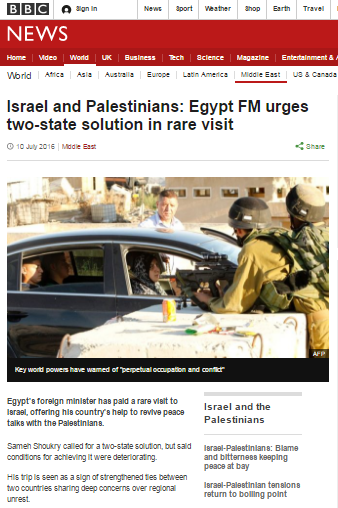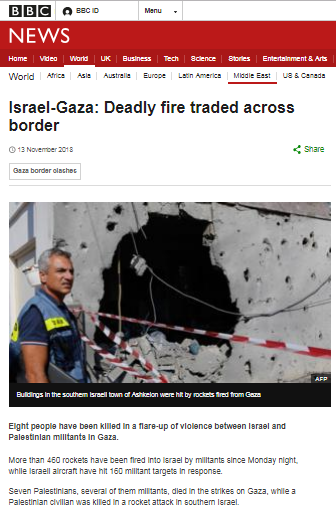July 10th saw the appearance of an article titled “Israel and Palestinians: Egypt FM urges two-state solution in rare visit” on the BBC News website’s Middle East page which did little to contribute to audience understanding of issues of mutual interest for Egypt and Israel and took the famous British understatement to the extreme in its tangential portrayal of a topic the BBC has long downplayed: Hamas’ collaboration with ISIS terrorists in the Sinai peninsula.
“His trip is seen as a sign of strengthened ties between two countries sharing deep concerns over regional unrest. […]
Co-operation between Israel and Egypt has intensified under Egyptian President Abdul Fattah al-Sisi.
Egypt faces Islamist militants in the Sinai region south of Israel, and both countries are wary of Gaza’s Hamas Islamist rulers.”
Significantly, the report also failed to clarify to readers that in contrast to the French proposal which was widely covered by the BBC’s Middle East editor last month, Egypt’s initiative to revive the process aimed at ending the Palestinian-Israeli conflict is based on direct negotiations between the parties.
Readers of this article were told that:
“The last round of peace talks between Israel and the Palestinians came to an end amid acrimony in April 2014.
The Palestinians accused Israel of reneging on a deal to free prisoners, while Israel said it would not continue negotiations after the Palestinians decided to bring the militant Islamist Hamas movement into a unity government.”
The BBC has been promoting that theme at least since the beginning of June:
“There have been numerous rounds of peace talks between Israel and the Palestinians since the early 1990s, with the most recent collapsing in acrimony in April 2014.
The Palestinians accused Israel of reneging on a deal to free prisoners, while Israel said it would not continue negotiations after the Palestinians decided to bring the Islamist Hamas movement into a unity government.” (June 3, 2016)
“The last round of peace talks between Israel and the Palestinians came to an end amid acrimony in April 2014.
The Palestinians accused Israel of reneging on a deal to free prisoners, while Israel said it would not continue negotiations after the Palestinians decided to bring the militant Islamist Hamas movement into a unity government.” (June 30, 2016)
“The last round of direct talks between Israel and the Palestinians came to an end amid acrimony in April 2014.” (July 1, 2016)
“The last round of peace talks between Israel and the Palestinians came to an end amid acrimony in April 2014.
The Palestinians accused Israel of reneging on a deal to free prisoners, while Israel said it would not continue negotiations after the Palestinians decided to bring the militant Islamist Hamas movement into a unity government.” (July 6, 2016)
Despite the obvious efforts being made by the BBC to shape audience views of that particular piece of history, the fact is that this simplistic yet widely promoted mantra does not provide an accurate description of events at the time.
It does not clarify that the fourth tranche of prisoner releases (intended to be conditional on the progress of talks) was delayed because the Palestinians both demanded the release of convicted Arab-Israeli terrorists and refused to agree to the continuation of negotiations after their official deadline. It does not inform audiences that the PA reneged on a previously made commitment not to join assorted UN agencies while negotiations were in progress and that it knew perfectly well that its decision to form a ‘unity government’ with the Hamas terror organisation which rejects the two state solution would be the final nail in the coffin of negotiations intended to achieve that aim.
As has been noted here before, the Palestinian Authority made three important choices between March 17th and April 23rd 2014 (not to accept the American framework, to join international agencies in breach of existing commitments and to opt for reconciliation with Hamas) which had a crucial – and apparently pre-planned – effect on the fate of the negotiations.
While the BBC’s portrayal of the end of the 2013/14 talks was highly partial and problematic even at the time, the fact that two years on it not only fails to meet its remit of enhancing audience understanding of the issue but actively impairs appreciation of why the 2013/14 talks collapsed is obviously cause for concern.
Related Articles:
Background to the BBC’s inaccurate framing of the end of Middle East talks
Revisiting the BBC’s framing of the 2013/14 Israel-PLO negotiations




